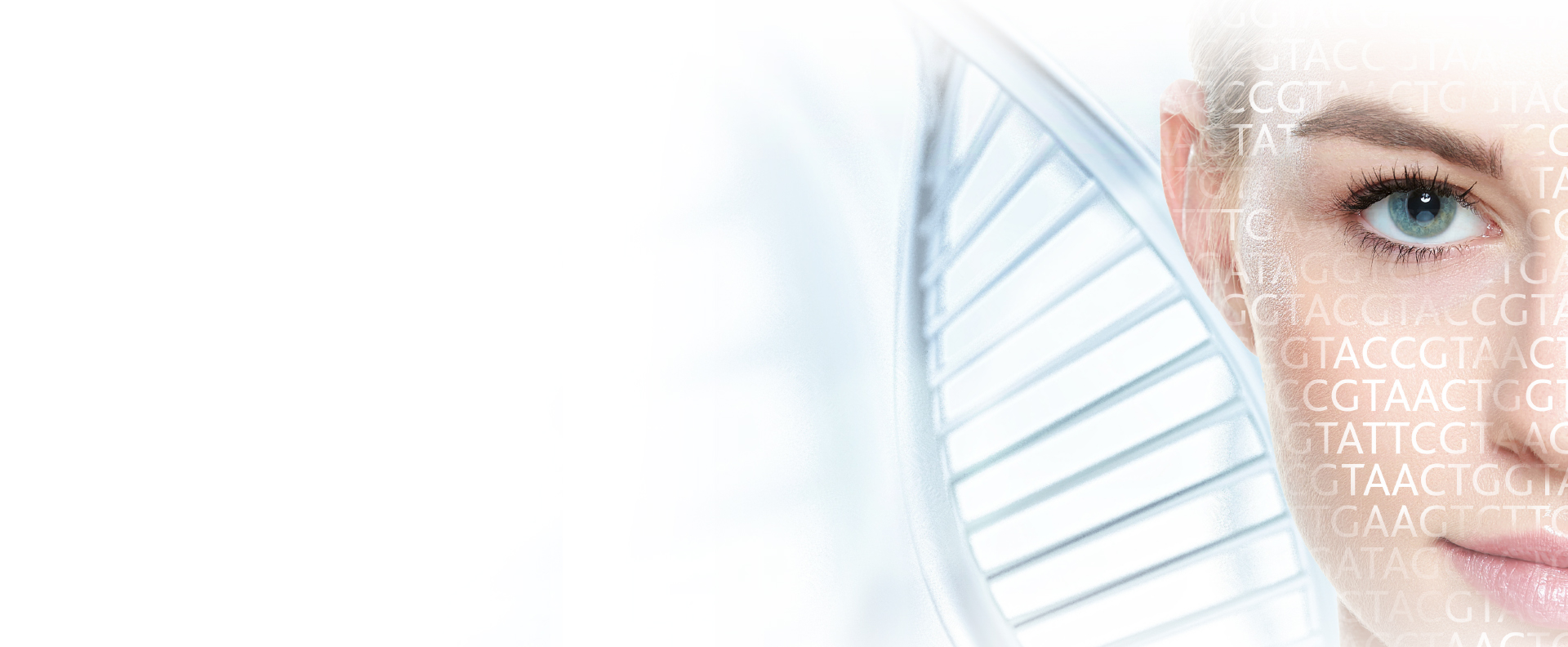IllnessAndrogen insensitivity syndrome
Summary
Curated single gene sequence analysis according to the clinical suspicion Androgen insensitivity syndrome
| Locus type | Count |
|---|---|
| Gen | 1 |
- (Extended panel: incl. additional genes)
- EDTA-anticoagulated blood (3-5 ml)
NGS +
Sanger
Loci
Gen
| Name | Exon Length (bp) | OMIM-G | Referenz-Seq. | Heredity |
|---|---|---|---|---|
| AR | 2763 | NM_000044.6 | XLR |
Informations about the disease
Androgen insensitivity syndrome (AIS) is a disorder that affects sexual development before birth and during puberty based on a 46XY karyotype. Due to the inability to respond to androgens, these patients usually have female external sex characteristics or signs of both male and female sex development. Complete AIS results in the external sex characteristics of females without a uterus, but with testes and sparse or absent pubic hair as well as in the arm pits. Affected individuals are usually raised as females and have female gender identity. Mal-descended testicular tissue may later malignant degenerate if not surgically removed. Mild forms of AIS occur when the body tissue only partially responds to androgens. People with partial AIS (Reifenstein syndrome) may have typically female genitalia or both male and female features or be typically male. They may grow up as males or females and have male or female gender identity. Individuals with mild AIS are born with male sex characteristics, are often infertile and tend to have breast enlargement during puberty. AIS is caused by mutations in the AR gene, which codes for the androgen receptor. AIS is inherited in an X-linked recessive manner. About two-thirds of all AIS cases are maternally inherited via an altered copy of the AR gene. The remaining cases are due to de novo mutations. DNA diagnostic yields reach up to 95% in complete AIS cases and <50% in individuals with partial AIS. Therefore, a negative molecular genetic result does not exclude the clinical diagnosis.
Reference: https://www.ncbi.nlm.nih.gov/books/NBK1429/
- Alias: (Complete) Androgen resistance syndrome (AR)
- Alias: Androgen insensitivity, AIS (AR)
- Alias: Androgen insensitivity, partial [Reifenstein syndrome] (AR)
- Alias: Androgen insensitivity, partial, with/without breast cancer (AR)
- Alias: Androgen-Resistenz [Goldberg-Maxwell, Morris] Syndrom (AR)
- Allelic: Hypospadias 1, XL (AR)
- Allelic: Prostate cancer, susceptibility to (AR)
- Allelic: Spinal + bulbar muscular atrophy of Kennedy (AR CAG)
- XLR
Bioinformatics and clinical interpretation
Test-Stärken
- DAkkS-akkreditiertes Labor
- EU-Richtlinie für IVD in Umsetzung
- Qualitäts-kontrolliert arbeitendes Personal
- Leistungsstarke Sequenzierungstechnologien, fortschrittliche Target-Anreicherungsmethoden und Präzisions-Bioinformatik-Pipelines sorgen für überragende analytische Leistung
- Sorgfältige Kuratierung klinisch relevanter und wissenschaftlich begründeter Gen-Panels
- eine Vielzahl nicht Protein-kodierender Varianten, die in unseren klinischen NGS-Tests mit erfasst werden
- unser strenges Variantenklassifizierungsschema nach ACMG-Kriterien
- unser systematischer klinischer Interpretations-Workflow mit proprietärer Software ermöglicht die genaue und nachvollziehbare Verarbeitung von NGS-Daten
- unsere umfassenden klinischen Aussagen
Testeinschränkungen
- Gene mit eingeschränkter Abdeckung werden gekennzeichnet
- Gene mit kompletten oder partiellen Duplikationen werden gekennzeichnet
- es wird angenommen, dass ein Gen suboptimal abgedeckt ist, wenn >90% der Nukleotide des Gens bei einem Mapping-Qualitätsfaktor von >20 (MQ>20) nicht abgedeckt sind
- die Sensitivität der Diagnostik zur Erkennung von Varianten mit genannten Testeinschränkungen ist möglicherweise begrenzt bei:
- Gen-Konversionen
- komplexe Inversionen
- Balancierte Translokationen
- Mitochondriale Varianten
- Repeat-Expansionen, sofern nicht anders dokumentiert
- nicht kodierende Varianten, die Krankheiten verursachen, die von diesem Panel nicht mit abgedeckt werden
- niedriger Mosaik-Status
- Repeat-Blöcke von Mononukleotiden
- Indels >50bp (Insertionen-Deletionen)
- Deletionen oder Duplikationen einzelner Exons
- Varianten innerhalb von Pseudogenen
- die analytische Sensitivität kann geringer ausfallen werden, wenn die DNA nicht von amedes genetics extrahiert wurde
Laboratory requirement
Die in grün gezeigten Gene sind kuratiert und werden als Gen-Panel untersucht. Eine Erweiterung des Panels (blau gezeigte Gene, jeweils ebenfalls kuratiert) kann auf Anfrage erfolgen. Sofern unter "Erweitertes Panel" ein Minuszeichen angezeigt wird, sind nur Core-/Basis-Gene verfügbar.
Für die Anforderung einer genetischen Untersuchung senden Sie uns bitte die Krankheits-ID auf einem Überweisungsschein. Bitte die Material-Angabe beachten.
Für privat versicherte Patienten empfehlen wir einen Antrag auf Kostenübernahme bei der Krankenversicherung.
Die Untersuchung wird auch für Selbstzahler angeboten.

